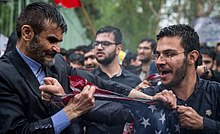
| Part of a series on |
| Conservatism in Iran |
|---|
 |
Anti-American sentiment in Iran is not new; the chant " Death to America" has been in use in Iran since at least the Islamic revolution in 1979, [1] [2] along with other phrases often represented as anti-American. A 1953 coup which involved the CIA was cited as a grievance. [3] State-sponsored murals characterised as anti-American dot the streets of Tehran. [4] [5] It has been suggested that under Ayatollah Khomeini anti-Americanism was little more than a way to distinguish between domestic supporters and detractors, and even the phrase "Great Satan" [6] which has previously been associated with anti-Americanism, appears to now signify either the United States or the United Kingdom. [7] [8]
Some studies show that anti-Americanism in Iran is related to support for political Islam. [9] US attempts to cripple Iran's economy have also significantly made Anti-American sentiment more common. Students from Tehran have been documented saying about US sanctions: “The more they push, the more it will lead to a rise in anti-Americanism.” and "It’s just a vicious circle." [10] [11]
See also
References
- ^ Robert Tait, 'America wants Iran to be dependent on it and Iranians don't want that', 2 February 2006, The Guardian.
- ^ Philip Herbst (2003). Talking terrorism: a dictionary of the loaded language of political violence. Greenwood Publishing Group. p. 6. ISBN 978-0-313-32486-4.
- ^ Tamim Ansary (2009) Destiny Disrupted: A History of the World Through Islamic Eyes: 334
- ^ Michael Dumper; Bruce E. Stanley (2007). Cities of the Middle East and North Africa: a historical encyclopedia. ABC-CLIO. p. 351. ISBN 978-1-57607-919-5.
- ^ Nathan Gonzalez (2007). Engaging Iran: the rise of a Middle East powerhouse and America's strategic choice. Greenwood Publishing Group. pp. ix. ISBN 978-0-275-99742-7.
- ^ Sanger, David E.: "Bombs Away?", Upfront, The New York Times, 16
- ^ Johnson, Boris (22 June 2009). "What has Ayatollah Khamenei of Iran got against little old Britain?". The Daily Telegraph. Londo.
- ^ "World News » UK is Tehran's 'Great Satan'". Gulf Daily News. 25 June 2009. Retrieved 11 May 2012.
- ^ Asadzade, Peyman (2019). "Faith or Ideology? Religiosity, Political Islam, and Anti-Americanism in Iran". Global Security Studies. 4 (4): 545–559. doi: 10.1093/jogss/ogy038.
- ^ "Iran sanctions stoke anti-US sentiment".
- ^ "US Economic Sanctions Harm Iranians' Right to Health".

| Part of a series on |
| Conservatism in Iran |
|---|
 |
Anti-American sentiment in Iran is not new; the chant " Death to America" has been in use in Iran since at least the Islamic revolution in 1979, [1] [2] along with other phrases often represented as anti-American. A 1953 coup which involved the CIA was cited as a grievance. [3] State-sponsored murals characterised as anti-American dot the streets of Tehran. [4] [5] It has been suggested that under Ayatollah Khomeini anti-Americanism was little more than a way to distinguish between domestic supporters and detractors, and even the phrase "Great Satan" [6] which has previously been associated with anti-Americanism, appears to now signify either the United States or the United Kingdom. [7] [8]
Some studies show that anti-Americanism in Iran is related to support for political Islam. [9] US attempts to cripple Iran's economy have also significantly made Anti-American sentiment more common. Students from Tehran have been documented saying about US sanctions: “The more they push, the more it will lead to a rise in anti-Americanism.” and "It’s just a vicious circle." [10] [11]
See also
References
- ^ Robert Tait, 'America wants Iran to be dependent on it and Iranians don't want that', 2 February 2006, The Guardian.
- ^ Philip Herbst (2003). Talking terrorism: a dictionary of the loaded language of political violence. Greenwood Publishing Group. p. 6. ISBN 978-0-313-32486-4.
- ^ Tamim Ansary (2009) Destiny Disrupted: A History of the World Through Islamic Eyes: 334
- ^ Michael Dumper; Bruce E. Stanley (2007). Cities of the Middle East and North Africa: a historical encyclopedia. ABC-CLIO. p. 351. ISBN 978-1-57607-919-5.
- ^ Nathan Gonzalez (2007). Engaging Iran: the rise of a Middle East powerhouse and America's strategic choice. Greenwood Publishing Group. pp. ix. ISBN 978-0-275-99742-7.
- ^ Sanger, David E.: "Bombs Away?", Upfront, The New York Times, 16
- ^ Johnson, Boris (22 June 2009). "What has Ayatollah Khamenei of Iran got against little old Britain?". The Daily Telegraph. Londo.
- ^ "World News » UK is Tehran's 'Great Satan'". Gulf Daily News. 25 June 2009. Retrieved 11 May 2012.
- ^ Asadzade, Peyman (2019). "Faith or Ideology? Religiosity, Political Islam, and Anti-Americanism in Iran". Global Security Studies. 4 (4): 545–559. doi: 10.1093/jogss/ogy038.
- ^ "Iran sanctions stoke anti-US sentiment".
- ^ "US Economic Sanctions Harm Iranians' Right to Health".